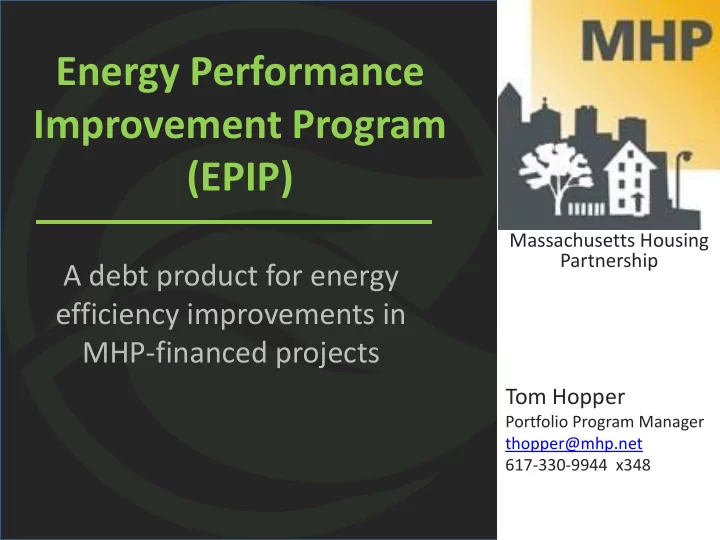

Energy Performance Improvement Program (EPIP) Massachusetts Housing Partnership A debt product for energy efficiency improvements in MHP-financed projects Tom Hopper Portfolio Program Manager thopper@mhp.net 617-330-9944 x348
MHP’s Energy Performance Improvement Program (EPIP) preserves existing MHP-financed rental housing by providing loans for energy efficient building improvements that result in energy usage reductions, operating cost savings, and long term financial stabilization.
The role of MHP financing in energy efficiency improvements • Grant programs may not always cover all of the desired improvements. By incorporating debt financing in an energy efficiency improvement funding plan, a more comprehensive scope of work can be achieved, with potential for higher levels of energy savings. • Affordable housing projects tend to have complex financing structures and multiple lenders and investors, making new borrowing difficult. Some projects may have significant opportunities for energy savings, but are not in a position to refinance/restructure their debt. • As first lien holder on all of the projects we finance, MHP is in a unique position to offer creative financing for energy improvements that works within a project’s existing financial structure.
Program Highlights • MHP can provide financing for energy-related building improvements that reduce energy usage and costs. Loans are sized such that the savings generated by the improvements more than cover the debt service payments. • Most EPIP loans are structured as an increase to the existing first mortgage loan and are secured by the real estate collateral. There are low transaction costs since we are working within each project’s existing debt structure . – Loans are increases to existing first mortgages. This simplifies documentation and minimizes legal costs. – Ability to pay for energy audit using replacement reserve funds. • Works well with other energy programs – When an EPIP loan is combined with grant sources, a broader scope of work can be completed and a higher level of energy savings can be achieved. – Combining EPIP and grant sources may also allow for critical non-energy capital needs to be addressed, with the generated energy savings covering the debt service for the entire scope of work. • Performance guarantee from Boston Community Capital (BCC) for at least a portion of the savings projected in the energy audit. – possible reduction in the loan amount if energy reduction goals are not met following construction.
What makes a good EPIP candidate? • Projects with existing MHP first mortgage debt • Owner pays utilities • Works best for projects with some room between original mortgage balance and outstanding loan amount • Works best for loans that are at least 5 years away from maturity
EPIP Example – Greentown Apartments • A hypothetical 50-unit project with an existing MHP mortgage wishes to complete $250,000 in energy efficiency improvements. The project also has a critical need for roof replacement, which would cost about $35,000. Soft costs are included, for a total development cost of $285,000. • Grant sources will pay for $150,000 of the energy related improvements, leaving a gap of $135,000 • The estimated water and utility cost savings from the improvements would support an EPIP loan increase of up to $200,000. • A $135,000 EPIP loan would allow the project to complete the full scope of energy efficiency work, as well as complete the much-needed roof replacement. The projected energy cost reductions will be sufficient to pay debt service, with enough savings left over to increase property cash flow.
Underwriting for energy efficiency – MHP’s efforts beyond EPIP • All MHP borrowers and prospective borrowers who are undertaking a refinance or a rehab are being encouraged to pursue an energy audit. • MHP has made enhancements to our underwriting practices to better incorporate the benefits of energy usage reduction measures on property performance. Determinations from an energy audit can help to inform our underwriting pro forma. • If you are an MHP borrower, or a prospective MHP borrower, we’d love to talk with you about your energy efficiency plans!
EPIP website: www.mhp.net/epip Tom Hopper Portfolio Program Manager thopper@mhp.net 617-330-9944 x348 Massachusetts Housing Partnership 160 Federal Street, 2 nd floor Boston, MA 02122 www.mhp.net
Recommend
More recommend